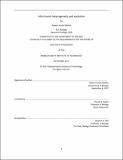Intra-tumor heterogeneity and evolution
Author(s)
Mathis, Robert Austin
DownloadFull printable version (3.557Mb)
Other Contributors
Massachusetts Institute of Technology. Department of Biology.
Advisor
Piyush B. Gupta.
Terms of use
Metadata
Show full item recordAbstract
Although the treatment of cancer is a major focus of biomedical research, many cancers are extremely hard to treat. Tumors likely resist treatment because each tumor is heterogeneous, and can evolve. Although tumor evolution has long been appreciated, it remains incompletely understood. In this thesis, I will explore two questions related to cancer heterogeneity and evolution: how evolution can affect plastic phenotypes, and the role of purifying selection in cancer evolution. Different cell states or phenotypes have been observed within tumors, and they are associated with treatment resistance and metastasis. The observation that these phenotypes are plastic leads to a conundrum: how can selection act on such an unstable phenotype? We determined that plasticity, in the form of cell state bias, varies widely across clones in a tumor. These different biases are heritable, with each cell faithfully passing its differentiation bias to its daughters. Simulations revealed that this makes plasticity an evolvable phenotype--- in a changing environment, an optimal state bias will be selected. The second question explored in this thesis is the role of purifying selection in cancer evolution. It is widely thought that tumor evolution is dominated by positive selection. We posited that, as in the evolution of species, purifying selection would prevent the fixation of deleterious mutations in tumors. Through computational analysis of tumor genomes, we determined that purifying selection acts to remove deleterious mutations. Genes under purifying selection must be important to tumors in vivo, as only mutations in these genes would be problematic. Consistent with this prediction, most genes under purifying selection in tumors were essential in cancer cell lines. To find genes essential to tumors but not generally cell-essential, we developed a method to find genes under increased purifying selection in one tumor type over others. This revealed a number of pathways under selection in melanomas, but not other tumor types, such as DNA damage pathways. By seeking genes important to tumors, but not generally essential, our analysis revealed potential therapeutic targets. Purifying selection offers an unprecedented view into which genes are essential to tumors in vivo, a finding predominantly inaccessible through experimentation.
Description
Thesis: Ph. D., Massachusetts Institute of Technology, Department of Biology, 2017. This electronic version was submitted by the student author. The certified thesis is available in the Institute Archives and Special Collections. Cataloged from student-submitted PDF version of thesis. Includes bibliographical references.
Date issued
2017Department
Massachusetts Institute of Technology. Department of BiologyPublisher
Massachusetts Institute of Technology
Keywords
Biology.